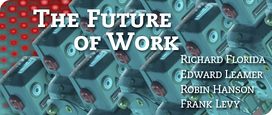Richard writes:
When I say “self-expression” he says “bohemian self-expression.” … He says my concepts are “overloaded,” but in reality it’s his adjectives and modifiers that are really loaded. … I have no stake in the cultural wars. None, Nada. How many times, in how many ways, can I say this. I already said that I’m a registered political independent and that my team runs the gamut from right to left and everything in between; … the only thing I can think from Robin’s last couple of posts is that it’s he who’s hung up on the cultural wars.
In the preface to his main book he wrote:
Social conservatives have gone apoplectic over my finding that places with high concentrations of gays and bohemians tend to have higher rates of innovation and economic growth. … often when I talk about the correlations I’m finding between cultural factors and economic health, people start shouting moralisms at me.
Richard, in that book you use the word “gay” on 54 pages and “bohemian” on 73 pages. When I and other readers try to figure out what you mean by notoriously vague words such as “creativity,” “diversity,” or “self-expression,” we naturally look to such frequently mentioned words to form more specific associations. And surely you are aware that “gay” and “bohemian” hardly have neutral associations in politics or the culture wars, especially when your ideal places turn out to be San Francisco and New York. Surely you did not expect the far left and the far right to be equally likely to object to your conclusions. Like it or not, you are in the culture wars.
Ed and Frank, I invite you to weigh in. How comfortable are you with Richard’s association of bohemian/gay style “creativity” with typical business innovation and “creative” jobs that are “more exciting, more fun and challenging”? How useful is it to abstract away the differences between these kinds of “creativity” in the way that Richard attempts?

